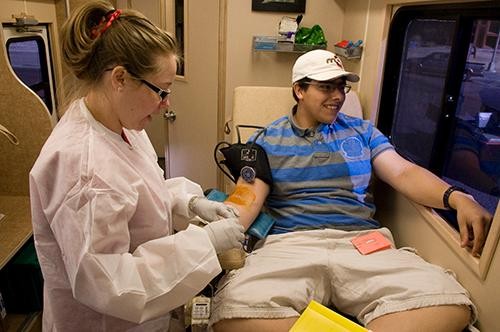The back-to-school blood drive is falling short of the American Red Cross’ expectations.
Today is the last day of the blood drive hosted by the Red Cross on the UA Mall this week.
Mary Owen, a Tech II working at the UA blood drive, said the turnout for this particular drive is slower than usual. It is usually pretty busy, Owen said.
While there is a daily quota the American Red Cross hopes to meet for the blood drive, Owen wasn’t sure it would be met.
Debra Deininger, communications manager at the American Red Cross, said the blood unit quota for Monday was 35 and the Red Cross received only 34 through donations. The goals for Tuesday and Wednesday were both 30 units. 22 units were donated on Tuesday and 33 on Wednesday, leaving the Red Cross six units of blood below their quota so far. The quota for today is once again 35 units.
The American Red Cross is planning another blood drive beginning next week on Feb. 2, and the organization hopes to perhaps meet their donation goals during that drive.
It is crucial for the American Red Cross Arizona Blood Services Region to meet their quotas because the state of Arizona usually stores one and a half days worth of blood on the shelves, according to Owen, who said they should have more in case of a disaster.
After someone donates their blood at a blood drive, it is packed and shipped to Pomona, Calif. to be scanned into a database. Test tubes of the individual units of blood are sent to Portland, Ore., one of five Red Cross National Testing Laboratories, to be tested for infectious diseases.
If the unit tests positive for a disease, the donation is discarded and the donator is informed.
If the blood is safe, it is labeled by blood type, released and returned to the community where it was collected.
Owen said the donations return in roughly three days to the hospitals in Arizona because the American Red Cross has contractual agreements with them.









